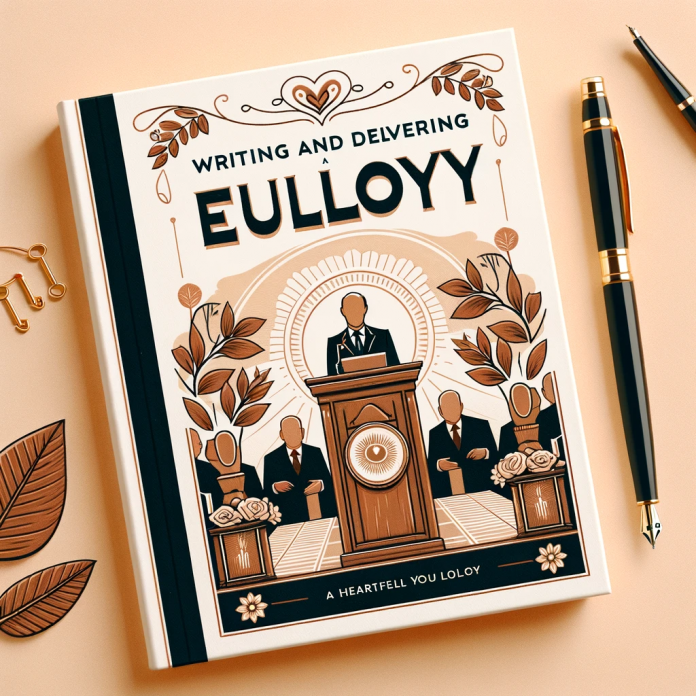Writing and delivering a eulogy is a task that requires careful thought, deep emotions, and a strong sense of empathy. It is a tribute to a loved one who has passed away, a way of celebrating their life and the memories they left behind. This guide will help you navigate through the process of writing and delivering a heartfelt eulogy.
Understanding the Purpose of a Eulogy
A eulogy serves as a way to remember the deceased and to share their life story with others. It's a moment to reflect on the person's life, their achievements, and their impact on those around them. It's not just about listing facts about their life, but about capturing their essence, their personality, and their spirit.
Delivering a eulogy can also be a therapeutic process for the speaker. It can help in the grieving process, allowing the speaker to express their feelings and emotions about the loss. It's a way of saying goodbye, of letting go, and of honoring the person's memory.
Preparing to Write a Eulogy
Gathering Information
Before you start writing, it's important to gather information about the person. This can include their life history, their interests, their achievements, and their values. You can talk to family members, friends, and colleagues to get a fuller picture of the person.
Remember to include personal stories and anecdotes. These can help to illustrate the person's character and to make the eulogy more relatable and engaging. They can also provide a sense of comfort and familiarity to those who are grieving.
Organizing Your Thoughts
Once you have gathered all the information, it's time to organize your thoughts. You can start by creating an outline of the eulogy. This can help you to structure your thoughts and to ensure that you cover all the important points.
Try to find a theme or a central message for the eulogy. This can be a particular quality of the person, a lesson they taught you, or a memory that encapsulates their spirit. This theme can serve as a thread that ties the entire eulogy together.
Writing the Eulogy
Starting the Eulogy
The opening of the eulogy should grab the audience's attention and set the tone for the rest of the speech. You can start with a quote, a poem, or a personal anecdote that encapsulates the person's spirit.
Introduce yourself and your relationship with the deceased. This helps to establish a connection with the audience and to give context to your words. Remember to speak from the heart and to express your feelings honestly and openly.
Developing the Body of the Eulogy
The body of the eulogy should cover the person's life story, their achievements, and their impact on others. Remember to focus on the positive aspects of their life and to celebrate their accomplishments.
Use personal stories and anecdotes to illustrate the person's character. These stories can be humorous, touching, or inspiring. They should reflect the person's personality and the way they lived their life.
Concluding the Eulogy
The conclusion of the eulogy should leave the audience with a sense of closure and a lasting impression of the person. You can end with a quote, a poem, or a personal message of hope and comfort.
Express your gratitude for the person's life and for the opportunity to share their story. This can be a moment of reflection and a way to say goodbye.
Delivering the Eulogy
Practicing the Eulogy
Before you deliver the eulogy, it's important to practice it several times. This can help you to become familiar with the flow of the speech and to identify any areas that need improvement.
Try to practice in front of a mirror or with a trusted friend or family member. This can help you to get feedback and to improve your delivery.
Delivering the Eulogy with Confidence
When it's time to deliver the eulogy, remember to speak clearly and slowly. Take deep breaths to calm your nerves and to maintain your composure.
Use your notes as a guide, but don't be afraid to speak from the heart. Remember that you are there to honor the person's memory and to share their story with others.
Conclusion
Writing and delivering a heartfelt eulogy is a meaningful way to honor a loved one who has passed away. It's a task that requires empathy, thoughtfulness, and a deep understanding of the person's life and legacy.
With careful preparation, thoughtful writing, and confident delivery, you can create a eulogy that celebrates the person's life, shares their story, and provides comfort to those who are grieving.
Recommended Products
- MUERDOU Memorial Urn Necklace — Elegant "No Longer by My Side, Forever in My Heart" cremation urn pendant necklace.
- Funeral Guest Book & Memory Card Set — Elegant guest book with matching memory cards for funeral and memorial services.
- Tree of Life Urn Pendant — A tree of life urn pendant for cremation ashes


-banner.png)





